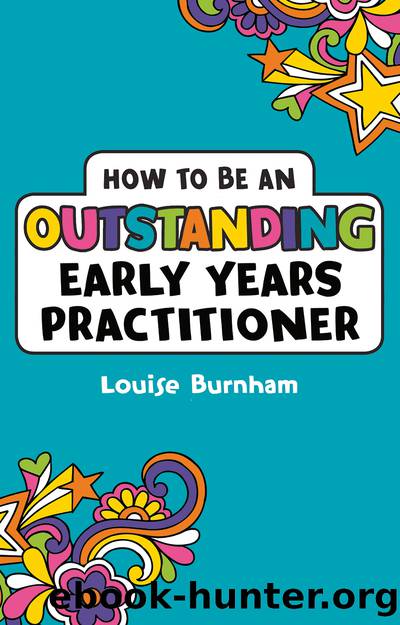How to Be an Outstanding Early Years Practitioner by Burnham Louise;

Author:Burnham, Louise;
Language: eng
Format: epub
Publisher: Bloomsbury Publishing Plc
Published: 2016-08-15T00:00:00+00:00
When planning for groups, if you have several children who speak English as an additional language, make sure you do not group them together for this reason; it does not have any bearing on their ability.
Children who are gifted and talented should have learning activities extended for them so that they are able to continue to develop beyond the learning objective, if necessary. Ask more searching questions and see whether they can develop ideas on their own or find their own method of working. Problem-solving activities are particularly effective and will develop thinking skills.
Resources â You should include basic resources on your plan, or those which you may forget, as well as links to any websites that you need, as it is easy to forget these things when you are busy and in the middle of your day. You may need to go out or find specialist resources which are not in your school or nursery, particularly if they are perishable or specific to your topic. Also remember when planning that additional staff, volunteers or students are your most valuable resource. You must set out how you will use them for the activity and be very clear about their role.
Key questions to include â It is sometimes helpful to include key questions on an activity plan, so that you focus on what you want to ask the children in order to develop their learning. You should, however, put these in a prominent place on your plan, or highlight them so that you remember to ask! As you gain in confidence, you may become less reliant on having things written down, and find the right questions easier to ask.
Timings â It may be helpful to think about these when planning â not to be a slave to them, but to give you a rough idea. You may plan for a focused activity to take ten minutes and it may only take three! As you become more experienced, you will learn to âreadâ children and to know when their attention is waning, or if the activity does not engage them. In this situation it is better to stop the activity, and to amend or change it next time.
Remember, you do not need to use all of these headings or include this amount of detail on every activity, every day: this would not be manageable. Rather, these are helpful to think about if you are going to work on a focused activity with children.
Evaluation
Evaluating learning activities
Shortly after you have completed your activity, daily or weekly plan, it will help you to evaluate what you have done, so that you can think about how it went. You can choose to include as much detail as you wish, depending on what is useful. For example, when reviewing a group activity, you may choose to note down how you could do it differently next time, particularly if you are going to do it the next day with another group. Evaluation is something we are constantly looking at, as it helps us to fine-tune our planning and think about future activities.
Download
This site does not store any files on its server. We only index and link to content provided by other sites. Please contact the content providers to delete copyright contents if any and email us, we'll remove relevant links or contents immediately.
The Art of Coaching Workbook by Elena Aguilar(50168)
Trainspotting by Irvine Welsh(21078)
Twilight of the Idols With the Antichrist and Ecce Homo by Friedrich Nietzsche(18324)
The Secret History by Donna Tartt(18268)
All the Missing Girls by Megan Miranda(14858)
Cat's cradle by Kurt Vonnegut(14804)
Ready Player One by Cline Ernest(14062)
Talking to Strangers by Malcolm Gladwell(12916)
Fangirl by Rainbow Rowell(8819)
The Compound Effect by Darren Hardy(8544)
Thirteen Reasons Why by Jay Asher(8492)
The remains of the day by Kazuo Ishiguro(8433)
Periodization Training for Sports by Tudor Bompa(7947)
Tools of Titans by Timothy Ferriss(7850)
Wonder by R. J. Palacio(7756)
The Lover by Duras Marguerite(7605)
Change Your Questions, Change Your Life by Marilee Adams(7405)
A Court of Wings and Ruin by Sarah J. Maas(7307)
The Complete Stick Figure Physics Tutorials by Allen Sarah(7162)
